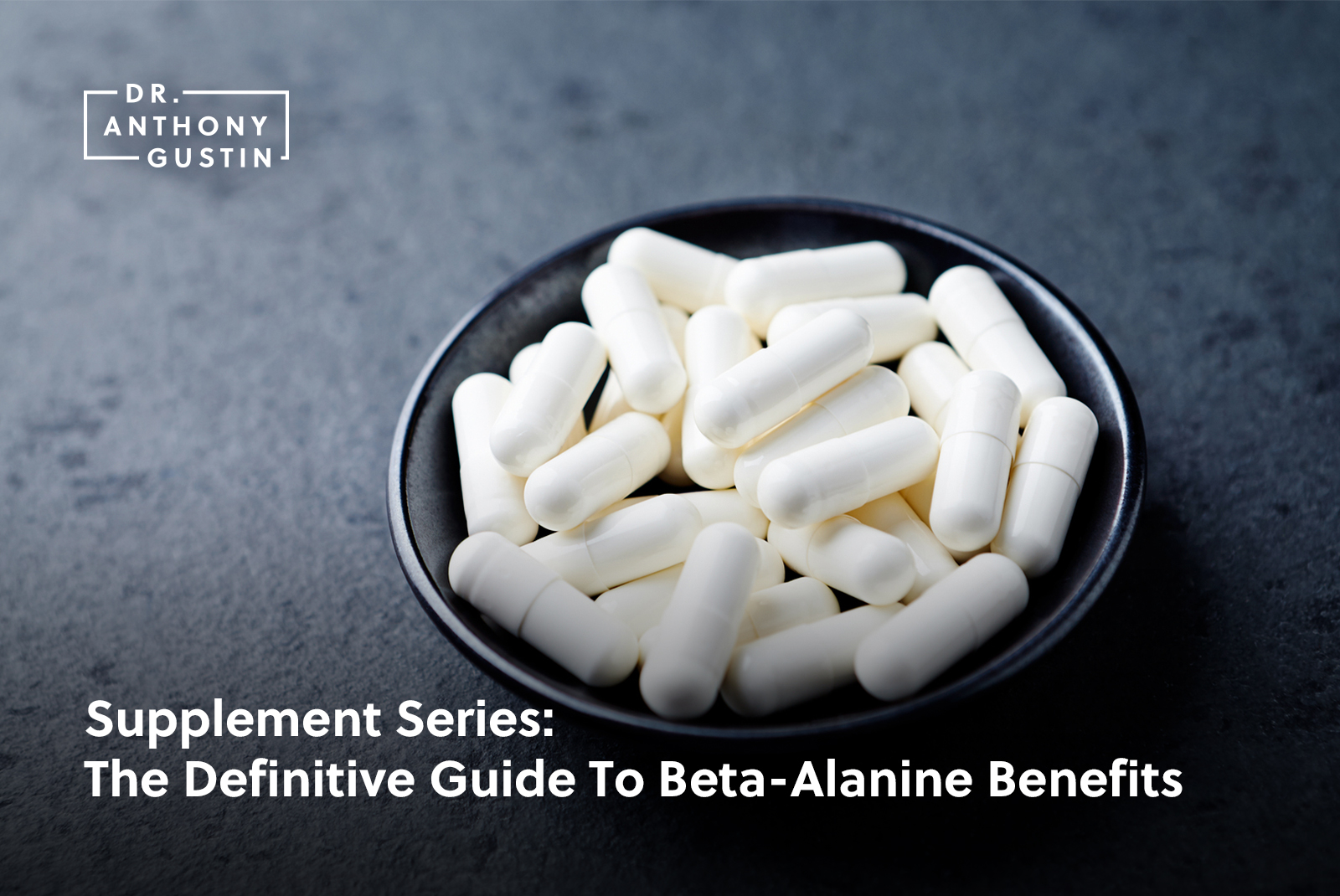Supplement Series: The Definitive Guide To Beta-Alanine Benefits

Supplements are sometimes looked at as sacrilege in the paleo template, but that is not how I see them. Essentially, if it can be used for benefit by your body with no negative consequence, you would be a fool to not utilize it. I’m writing a series of blog posts on supplements so people can have the information they need to make the decisions they need if the benefit fits their goals. The first article was the definitive guide on creatine. The second supplement up on the Supplement Series is on beta-alanine benefits.
Because these conversations can get pretty technical, I’ve added human translations where necessary so you can TL;DR whenever you’d like.
What is beta-alanine?
Beta-alanine is amino acid that the body make endogenously in the liver. Humans also acquire beta-alanine through consumption of animal muscle meat (sounds familiar). LINK to creatine. The supplemental form of beta-alanine is biochemically identical to that which you would consume in animal products.
Human translation: Beta-alanine is a little naturally occurring amino acid also found in animal meat.
What does beta-alanine do?
Beta alanine has been shown to be the rate limiting precursor to carnosine synthesis. Research shows that with supplementation of beta-alanine for four weeks, carnosine levels increase by 64% and for ten weeks, up to 80%.
Ok, great, so beta-alanine drastically increases carnitine, but why is that good? Carnosine is responsible for the buffering system in your muscle tissue. Meaning, the less carnosine you have, the quicker your body with experience fatigue, “burning”, loss of strength and speed and ability to quickly fire your muscles.
Carnosine also acts an extremely potent antioxidant, which will rapidly increase your body’s ability to recover from tissues after a workout. When you workout, your body is damaged, reactive oxidative species form, and your body must clear those to decrease inflammation and speed up recovery. This is what antioxidants do.
Beta-alanine also helps shuttle the extra positively charged hydrogen ions out of your muscle cells. The hydrogen ions are made from the byproduct of increased energy utilization. Too much of these particles can cause undue muscular tissue damage as well as “burning” feelings when you’re working out. Both of these things halt recovery and limit the intensity at which you can perform. Beta-alanine gets rid of those things.
Human translation: Beta-alanine drastically increases carnosine levels. Carnosine drastically delays onset of fatigue, decreases burning and improves tissue repair. Beta-alanine also decreases hydrogen in your tissues, which improves onset of fatigue and burning.
Is beta-alanine safe to take / what is that beta-alanine tingle?
When some individuals supplement with beta-alanine, they experience paresthesia (a tingling sensation) on the face, neck, hands or other body parts. Don’t worry! This is normal. If you’re new to beta-alanine, your body may exhibit this response quite surprisingly. The paresthesia should last no longer than 60-90 minutes and will decrease with continued supplementation. There is no proposed negative reaction to the mechanism of action.
The tingling comes from the Mas-related gene family of G-protein-receptors expressed in the dorsal root ganglion lead to neuronal hyperstimulation. Basically, potassium levels open up, and your nerves fire quicker. This is desirable for any athlete that is looking for speed or power, as the quicker the nerves can transmit the need to contract a tissue, the more speed and and power the muscles will generate.
Human translation: The beta tingle is your nerves firing quicker. This feeling will subside the more you use it.
As with creatine, beta-alanine is made in the body, is acquired through nutrition, and supplements are biochemically identical to both of those forms. Beta-alanine is not fat soluble and will not store excess amounts in tissues. Therefore, there are no inherent risks to supplementing with adequate amounts of beta-alanine.
Human translation: Yes, beta-alanine is a common amino acid and is safe to take.
Should you take beta-alanine?
If you are athlete who is doing max effort and high intensity exercise, then yes, absolutely. If you are a power or strength athlete, absolutely. If you read above what increased carnosine and beta-alanine do (decreases fatigue and burning, increases recovery, increases strength) then clearly, yes, you should. As with creatine, there is minimal research on endurance effects, however, preliminary results look exciting for reducing muscle damage.
Human translation: If you do high intensity, perform to fatigue, or are looking for strength or power, yes, absolutely.
Where should you get beta-alanine from?
There are no special forms of beta-alanine. As it has grown in popularity, different supplement manufacturers will come up with different proprietary blends that are “superior” for one reason or another, which is completely bogus. Amino acid structures are, and should be, all identical. You don’t want any different type of ester, even if there is a hypothesized way for better uptake. Your body knows how to utilize the real food forms, so keeping ingestion as close to that as possible is ideal.
As a caveat, if you are a heavy responder to the beta-tingle effect and have tried increasing amounts and dosages, you can look for some time-released versions of beta-alanine which should help ameliorate any of those effects. You should first try a staggered dose of regular beta-alanine though.
Human translation: Any generic beta-alanine should be sufficient.
How much beta-alanine should you take?
Studies consistently show that between 2.5 – 3 grams of beta-alanine are sufficient to increase the intramuscular stores of carnosine and have the effect. Some studies have even shown drastic benefits down to around 2g.
Beware of proprietary blends! Beta-alanine is not a cheap ingredient in a workout supplement, so many times if you get a supplement that has many different ingredients in it, beta-alanine will dosed extremely low and at a sub physiological dose, meaning you’re not getting anything out of it. Use brands that are transparent and dose high enough.
Human translation: Somewhere between 2-3 grams to get beta-alanine benefits. No need overthink this. If you are bigger, 3g, if you are littler, 2g.
When should you take beta-alanine?
Great question! Unlike creatine and some other supplements, timing to get beta-alanine benefits can be pretty crucial. As many can tell with the “beta tingle,” beta-alanine acts quick to increase carnosine levels and upregulates the nervous system. Therefore, you want to be taking your beta-alanine 20-30 minutes before a training session to get the most optimal results.
Sustained longer term supplementation is also ideal for a more broad carnosine level increase, however, you will get the most bang for your buck dosing before a workout than at random times in throughout the day.
Human translation: Take beta-alanine before a workout.
Just as you can tell with the creatine article, research has overwhelmingly pointed me in the direction of beta-alanine supplementation for most people who want to create
This leads me to suggest the product I meticulously planned and developed — pureWOD PRE. PRE is a pre-workout that is developed without the use of binding agents, artificial flavorings or colorings, artificial sweeteners, or any other BS and at dosages that actually make a difference. I couldn’t find a paleo pre-workout, so I made one. And yes, PRE has beta-alanine in it.
SUMMARY OF BETA ALANINE BENEFITS
-
Beta-alanine is a naturally occuring amino acid
-
Beta-alanine decreases fatigue, burning and muscular damage and increases strength and energy utilization
-
Beta-alanine should be taken before a workout, at about 2-3g dose
-
Beta-alanine does not have to be any special form




